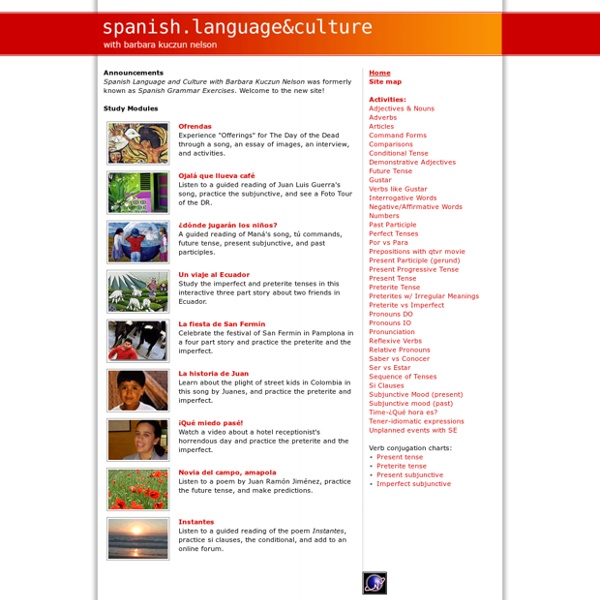Home
Home Activities: Adjectives & Nouns Adverbs Articles Command Forms Comparisons Conditional Tense Demonstrative Adjectives Future Tense Gustar Verbs like Gustar Interrogative Words Negative/Affirmative Words Numbers Past Participle Perfect Tenses Por vs Para Prepositions with qtvr movie Present Participle (gerund) Present Progressive Tense Present Tense Preterite Tense Preterites w/ Irregular Meanings Preterite vs Imperfect Pronouns DO Pronouns IO Pronunciation Reflexive Verbs Relative Pronouns Saber vs Conocer Ser vs Estar Sequence of Tenses Si Clauses Subjunctive Mood (present) Subjunctive mood (past) Time-¿Qué hora es? Tener-idiomatic expressions Unplanned events with SE Verb conjugation charts: Present tense Preterite tense Present subjunctive Imperfect subjunctive
Related: maresteban
¡Bienvenidos a AsíSeHace.net!
Más arriba: Spanish Language Exercises
Más arriba (©2013 by Gary Aitken) is an interactive workbook of introductory Spanish language exercises, based on the pictorial contextualization of fundamental vocabulary and language points. The exercise material includes full-colour drawings, sound clips, instant feed-back, vocabulary help and a voice recorder (powered by Vocaroo). Más arriba can be used with any introductory approach. You can follow the alphabetical Exercise Index directly below or click here to go to the Lesson Index, provided for users of the Third Canadian Edition of ¡Arriba! Comunicación y cultura (©2013 by Pearson Education Canada). Click here to learn how to type accents in Spanish.
De cine | Actividades de ELE con audiovisuales
Spanish Jokes - Humor in Spanish to Have Fun
Spanish Jokes. On this page you find our selected jokes in Spanish. Learn Spanish while having fun with the jokes published on the don Quijote website. A joke is a saying or short story that involves a play on words or an absurd or surprising fact that makes us laugh. Understanding the humor of a language and enjoying jokes in it is a step towards learning it further. Joke of the week -¿Por qué estás delante del ordenador con los ojos cerrados? Here is a selection of jokes from recent weeks. Week: 14 / 2014 - Cariño, dame el bebé. - Espera a que llore. - ¿Por qué?
Spanish Verb Mastery - Free Spanish Verb Charts
Spanish Language & Culture | Home
Home Activities: Adjectives & Nouns Adverbs Articles Command Forms Comparisons Conditional Tense Demonstrative Adjectives Future Tense Gustar Verbs like Gustar Interrogative Words Negative/Affirmative Words Numbers Past Participle Perfect Tenses Por vs Para Prepositions with qtvr movie Present Participle (gerund) Present Progressive Tense Present Tense Preterite Tense Preterites w/ Irregular Meanings Preterite vs Imperfect Pronouns DO Pronouns IO Pronunciation Reflexive Verbs Relative Pronouns Saber vs Conocer Ser vs Estar Sequence of Tenses Si Clauses Subjunctive Mood (present) Subjunctive mood (past) Time-¿Qué hora es? Tener-idiomatic expressions Unplanned events with SE Verb conjugation charts: Present tense Preterite tense Present subjunctive Imperfect subjunctive
Mundo Ele | Material y actividades de español
Q&A Spanish
Your new Spanish helpline from Radio Lingua When you’re learning a language on your own and you don’t have access to a teacher or a native speaker it can sometimes be difficult to get the help you need in order to build confidence in the language and make progress. Here at Radio Lingua we receive requests for help all the time through our website, email, our help desk, Twitter and Facebook. We’ve decided that the best way to answer these questions is by launching our new weekly show Q&A Spanish. Listen to the show The first season of Q&A Spanish launches on Tuesday 18th October and will run for 10 weeks. Do you have a question? There are a number of ways to send us your question, from email to Skype, Twitter and Facebook, or if you prefer you can leave us a voicemail in the US on 408 540 6118, or in the UK on 0845 834 0115.
marcoELE
Related:



